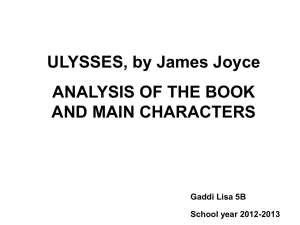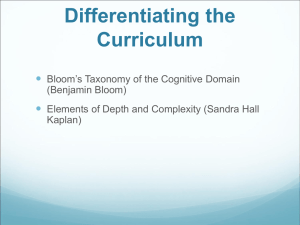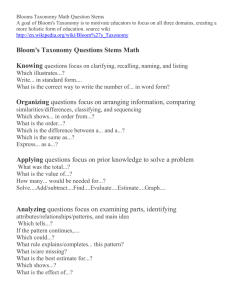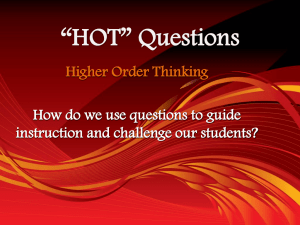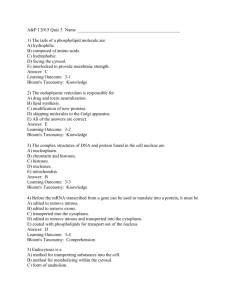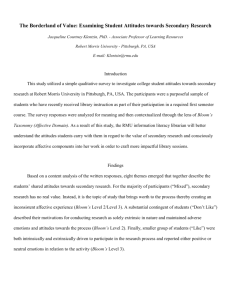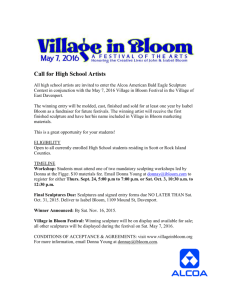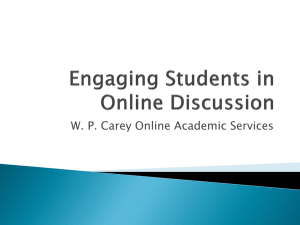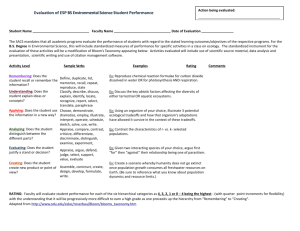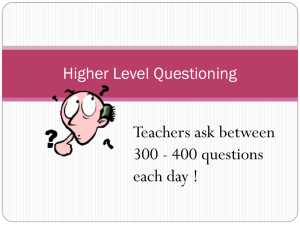Stone vs paper - Liceo Morgagni
advertisement
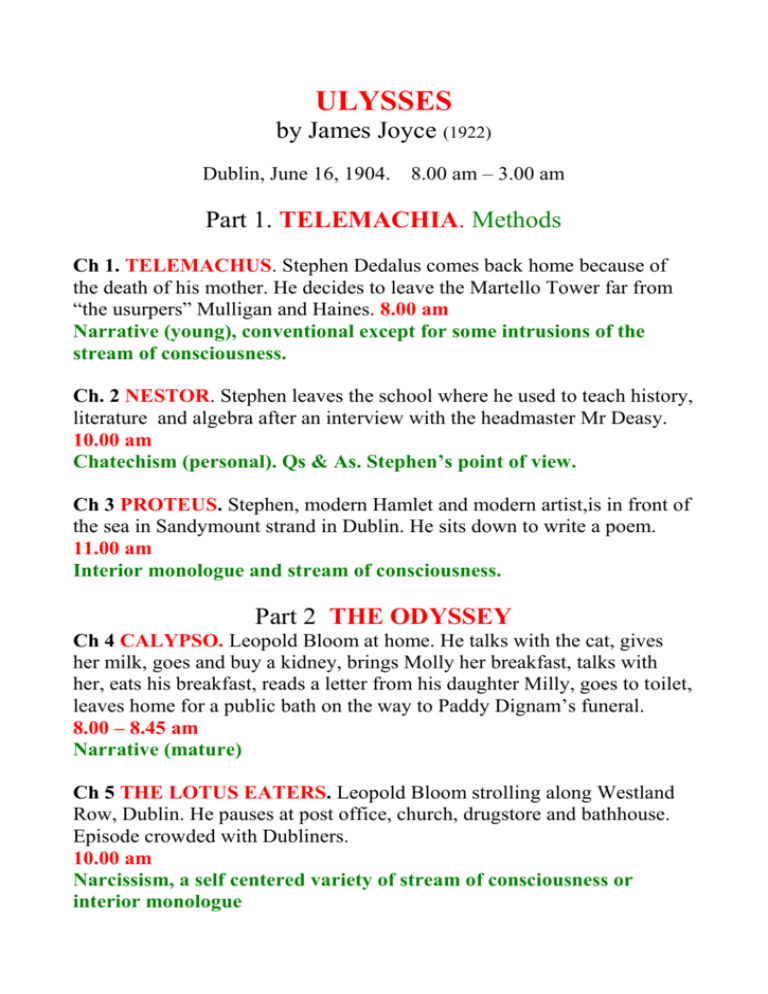
ULYSSES by James Joyce (1922) Dublin, June 16, 1904. 8.00 am – 3.00 am Part 1. TELEMACHIA. Methods Ch 1. TELEMACHUS. Stephen Dedalus comes back home because of the death of his mother. He decides to leave the Martello Tower far from “the usurpers” Mulligan and Haines. 8.00 am Narrative (young), conventional except for some intrusions of the stream of consciousness. Ch. 2 NESTOR. Stephen leaves the school where he used to teach history, literature and algebra after an interview with the headmaster Mr Deasy. 10.00 am Chatechism (personal). Qs & As. Stephen’s point of view. Ch 3 PROTEUS. Stephen, modern Hamlet and modern artist,is in front of the sea in Sandymount strand in Dublin. He sits down to write a poem. 11.00 am Interior monologue and stream of consciousness. Part 2 THE ODYSSEY Ch 4 CALYPSO. Leopold Bloom at home. He talks with the cat, gives her milk, goes and buy a kidney, brings Molly her breakfast, talks with her, eats his breakfast, reads a letter from his daughter Milly, goes to toilet, leaves home for a public bath on the way to Paddy Dignam’s funeral. 8.00 – 8.45 am Narrative (mature) Ch 5 THE LOTUS EATERS. Leopold Bloom strolling along Westland Row, Dublin. He pauses at post office, church, drugstore and bathhouse. Episode crowded with Dubliners. 10.00 am Narcissism, a self centered variety of stream of consciousness or interior monologue Ch 6 HADES. Funereal cortege to the cemetery. They pass by Stephen on his way to the beach and Blazes Boylan on his way to Molly. In his carriage he talks with citizens of Dublin. At the mortuary chapel he thinks about the burial of the dead. 11.00 am Incubism, brooding over. A variety of interior monologue Ch 7 AEOLUS. Bloom is a canvasser for advertisements. He enters the newspaper for his business. Stephen enters with the letter of his headmaster. Dubliners in the editorial office talk incessantly. 12.00 am Enthymemic (a sillogism with part suppressed) is as suitable to journalism as to the plights of Stephen and Bloom. Development of journalistic style Ch 8 LESTRYGONIANS. On his way to the library Bloom has food in mind. He eats a gorgonzola sandwich at Byrne’s pub and has adventures on the road. 1.00pm Peristaltic applies to structure and movement too. Recurrent lines with change. Ch 9 SCYLLA AND CHARYBDIS. In the director’s office of the National Library, Stephen discusses Shakespeare with a critic and librarians. Bloom enters passing next to Mulligan and Stephen. The latter exposes his theory on Hamlet, father and son relationship. 2.00 pm Literary criticism Ch 10 THE WANDERING ROCKS. Dublin is the character of this chapter. It’s the pause in the action. Procession of Father Conmee (Church) and cavalcade of the viceroy (state). 3.00 pm Labyrinthine, Dublin more than scenery is microcosmic, our world in little. Ch 11 THE SIRENS. On his way to a meeting, Bloom stops for another lunch. He eats liver. In the adjoining bar, the barmaids flirt with Dubliners. Boylan is ready for his meeting with Molly. Men sing in the pub, Bloom eats , answers Martha’s letter and thinks about Molly and her lover. 4.00 pm Fugal. Music and ear determine structure. Ch 12. THE CYCLOPS. At Barney Kirman’s bar Bloom, waiting for Martin Cunningham, joins the conversation of a nationalist. Out of place he fails to offer a drink. The violent nationalist hits Bloom the jew. 5.00 pm Gigantism. Nameless narrator, a typical Dubliner Ch 13. NAUSICAA. Having visited the widow Mrs Dignam, Bloom retreats to the beach at Sandymount. On the beach Gerty MacDowell and her two girlfriends are playing with a ball. She looks at Bloom and he at her. 9.00 pm For Bloom’ s part interior monologue, for Gerty’s the style of a cheap Victorian novelette. Ch 14 OXEN OF THE SUN. At the maternity hospital Bloom encounters Stephen and some medical students drinking and joking downstairs while upstairs Mrs Purefoy is in labor. They mock childbirth, only Bloom is humane, reverent and compassionate. He’s always an outsider. After the birth they go in the pub. Bloom tags along drunken Stephen. 11 pm Embryonic development. Literary parodies on English literature. Ch 15 CIRCE. Drunken Stephen leads Bloom in Bella Cohen’s brothel. Bloom takes responsibility over Stephen. In the street Stephen is attacked by two drunken soldiers that knock him down. Bloom helps him 12.00 pm Hallucination Part 3 ITHACA Ch 16. EUMAEUS. At Skin the goat’s shelter Bloom offers coffee and bun to Stephen that gradually recovers. Friendly Bloom invites him home They walk arm in arm. 1.00am Narrative(old) illustrates fatigue Ch 17 ITHACA. A parallel course takes both to 7, Eccles Street. They have cocoa in the kitchen. Bloom invites Stephen to stay but he declines with gratitude. Stephen goes off and Bloom goes in the parlour and then to bed where Molly asks him about his day. 2.30 am Scientific, inhuman and objective. All is reduced to abstraction, qs & as. Ch 18 PENELOPE. Molly’s monologue on life. It begins with the female word yes. According to Joyce the four cardinal points are the female breast, arse, womb and cunt. The final yes, yes, yes is a yes to life, to your own destiny. 3.00 am Monologue, stream of consciousness OPERE MONDO by Franco Moretti (pp.115-170) The stream of consciousness is the best way to face the best a town can offer you, the best but also the most dangerous; too many stimula, and too differnt and too intense. It gives shape to metropolis and a reason for its inhabitants. These stimula are threatening but attractive too, a shopwindow in a big department store is the whole world at a glance, it is seductive and so is advertisement. It protecs goods from the consumer and at the same time it makes them suitable for every person. The stream is like ads and Leopold is the true metropolitan hero. Our world is a dual world based on standard products but unique. Goods have words, a price, labels and modern urban landscapes are full of words, towns of words. In this context to find your own way you need a weak grammar, a cubism of languages = that is the stream of consciousness, short sentences, segments, the disappearance of the I and the invasion of things, objects. Ads are the sender, the stream is the receiver. Ads is a flirt with goods to solve the paradox of modern world: goods for every one but the impossibility to have all of them. In the streets of Dublin Leopold sees but doesn’t see, a quick sight and go, he inreases distraction not consciousness, a positive behaviour to survive in a metropolis full of simultaneous stimula. The paratactic structure is open, it gives many possibilities. Modern man is inattentive in order to socialize, he is receptive , passive like a radio listener, like the stream. Monument vs affiche Stone vs paper Duty vs superficiality, possibility. Possibility in literature is multiplicity, a number of possible solutions. So paratactic structure means independent, self concluded sentences on an horizontal approach. It sounds senseless but it helps to live in metropolis where you need to be more intelligent and stupid too. The stream is the language of big towns. With it the world is smaller, Bloom’s common places make the unknown more familiar furthermore, they are the scaffolds of Bloom’s casual associations. On that famous day 14 June 1904 Bloom doesn’t do anyting special, he walks, remembers, looks around, dreams, thinks. He simply sets up his receptive skill, his imaginary. What speaks in his stream is the pre-conscious, the place of possibilities
